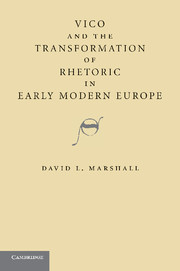Crossref Citations
This Book has been
cited by the following publications. This list is generated based on data provided by Crossref.
MARSHALL, DAVID L.
2010.
THE POLIS AND ITS ANALOGUES IN THE THOUGHT OF HANNAH ARENDT.
Modern Intellectual History,
Vol. 7,
Issue. 1,
p.
123.
Ferri, Sabrina
2012.
Vittorio Alfieri's Natural Sublime: The Physiology of Poetic Inspiration.
European Romantic Review,
Vol. 23,
Issue. 5,
p.
555.
Sokolov, Pavel
2013.
Scientific Fact between New Science and Scienza Nuova: Giambattista Vico's Factum and John Toland's Matter of Fact.
SSRN Electronic Journal,
Kalbfleisch, Elizabeth
2013.
Anxieties of Legitimacy: The Origins and Influence of the “Classicist Stance” in American Rhetoric Studies.
Advances in the History of Rhetoric,
Vol. 16,
Issue. 1,
p.
82.
Hahn, Edward
2013.
Writing in the Age of Humans: (Post)Rhetoric-Composition and VichianIngenium.
Rhetoric Review,
Vol. 32,
Issue. 4,
p.
419.
Kalbfleisch, Elizabeth
2013.
Anxieties of Legitimacy: The Origins and Influence of the “Classicist Stance” in American Rhetoric Studies.
Advances in the History of Rhetoric,
Vol. 16,
Issue. 1,
p.
82.
Verene, Donald Phillip
2014.
The Encyclopedia of Political Thought.
p.
3776.
Pierce, April Elisabeth
2014.
Towards a new romanticism.
Thesis Eleven,
Vol. 123,
Issue. 1,
p.
17.
Devetak, Richard
2014.
A rival Enlightenment? Critical international theory in historical mode.
International Theory,
Vol. 6,
Issue. 3,
p.
417.
Boháček, Kryštof
2014.
Aristotle and New Rhethoric.
Aither,
Vol. 6,
Issue. 11,
p.
100.
Davis, Robert A.
2014.
Giambattista Vico and the wisdom of teaching.
Asia Pacific Education Review,
Vol. 15,
Issue. 1,
p.
45.
O’Gorman, Ned
2015.
Milton, Hobbes, and Rhetorical Freedom.
Advances in the History of Rhetoric,
Vol. 18,
Issue. 2,
p.
162.
O’Gorman, Ned
2015.
Milton, Hobbes, and Rhetorical Freedom.
Advances in the History of Rhetoric,
Vol. 18,
Issue. 2,
p.
162.
Lherm, Frannois Renn
2016.
The Jurisdiction of Comfort: Auditing Beyond Auditability. An Investigation into the Use of Professional Scepticism in the Audit of Estimates.
SSRN Electronic Journal,
Al-Douri, Taha
2017.
On the Complexity of the Universal Order in Vico’s Establishing Principles.
Systems,
Vol. 5,
Issue. 2,
p.
31.
Patalano, Rosario
2017.
Geometry of Money in the Neapolitan Eighteenth Century.
History of Political Economy,
Vol. 49,
Issue. 4,
p.
631.
Gould, Rebecca Ruth
2018.
Democracy and the Vernacular Imagination in Vico’s Plebian Philology.
History of Humanities,
Vol. 3,
Issue. 2,
p.
247.
Colapietro, Vincent M.
2018.
The Actuality of Philosophy Thought Over Once Again.
The Journal of Speculative Philosophy,
Vol. 32,
Issue. 1,
p.
3.
R. Mitchell, Gordon
Hahn, Taylor
and
Aonuma, Satoru
2018.
Policy debate topic change controversies in the U.S. and Japan.
Argumentation and Advocacy,
Vol. 54,
Issue. 1-2,
p.
34.
Marinelli, Kevin
2018.
Demonstrating without demands: re-articulating the black populist subject within the post-racial mystique.
Argumentation and Advocacy,
Vol. 54,
Issue. 3,
p.
179.





